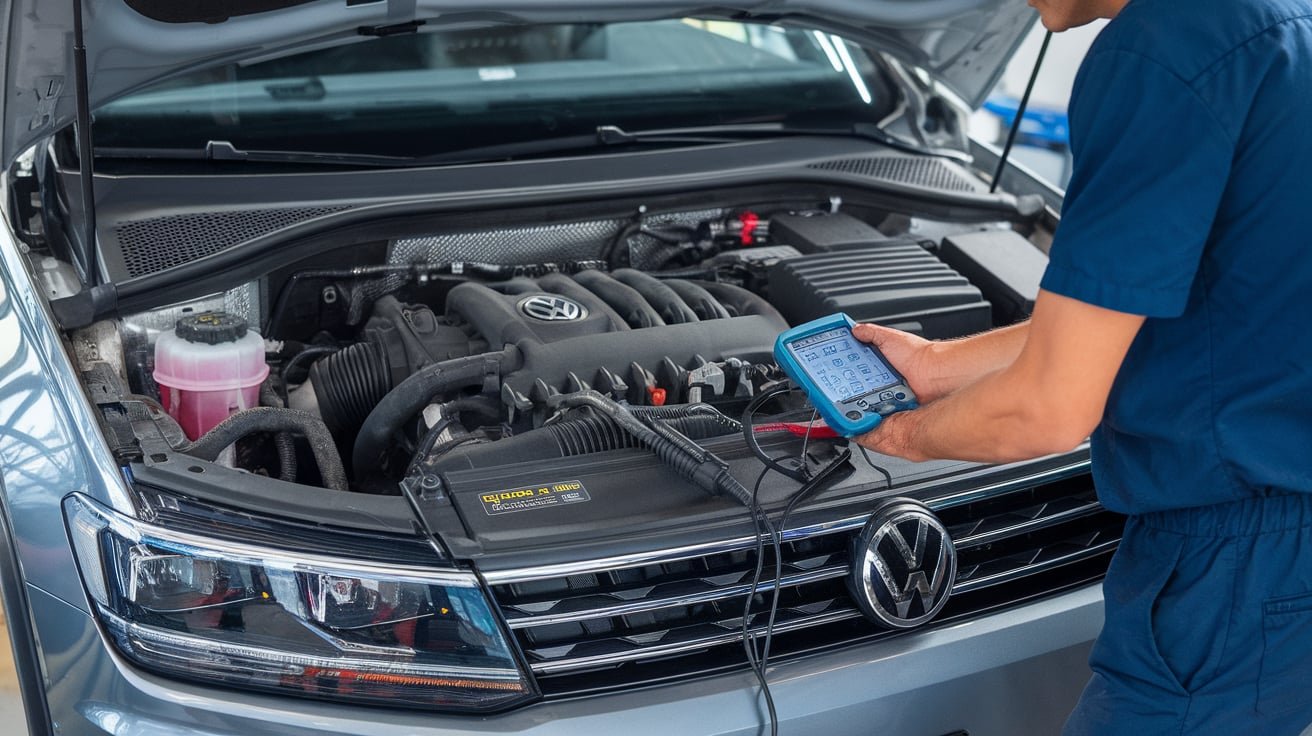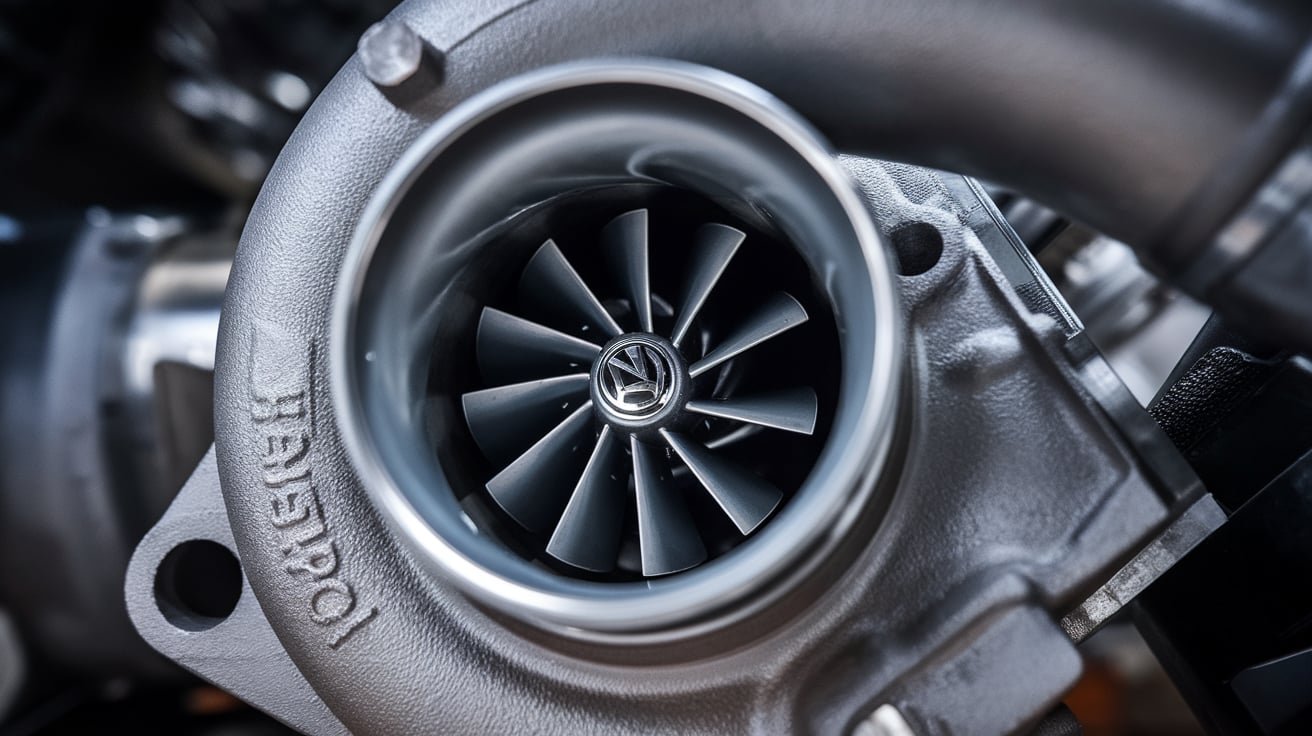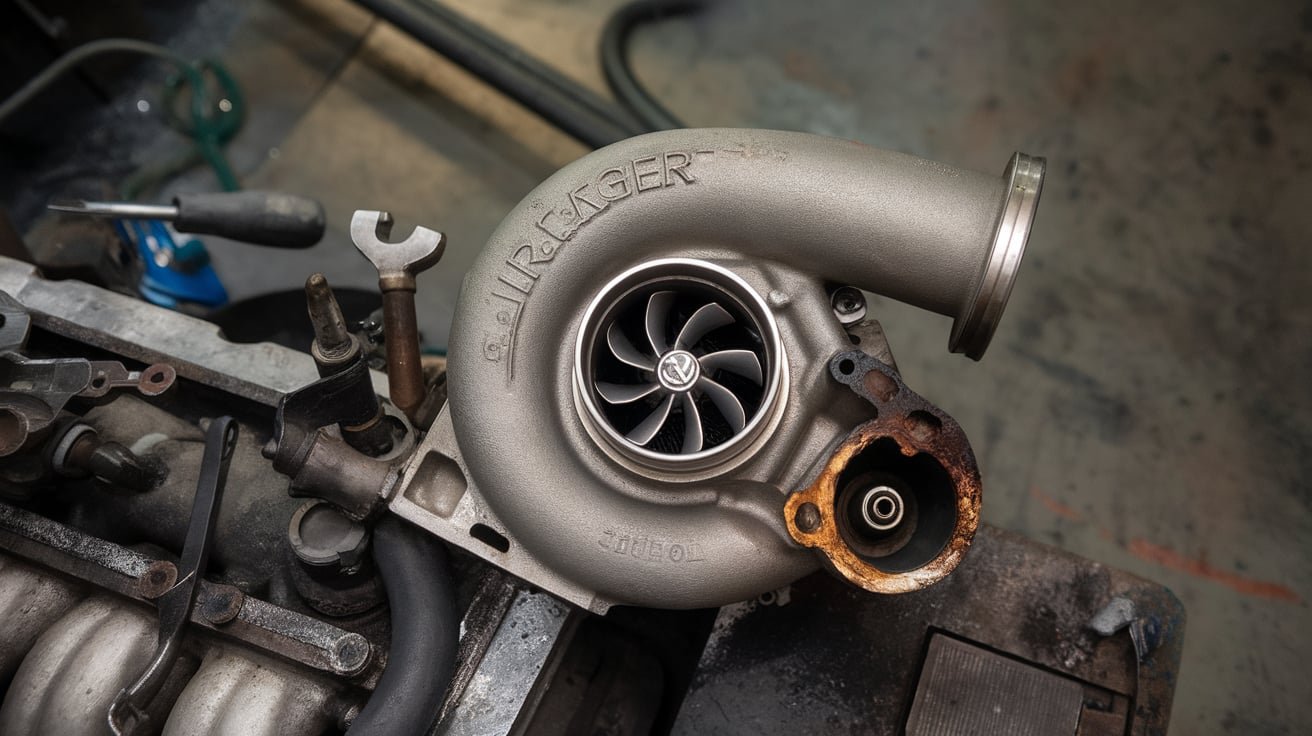
Quick Fixes for VW Turbocharger Issues Without Breaking the Bank
VW turbocharger issues may result in decreased power, odd sounds, smoke, or check engine warnings if you own a Volkswagen. Numerous VW turbocharger issues are easily and reasonably resolved, albeit they frequently arise in vehicles with excessive mileage or poor maintenance. Costly damage can be avoided with easy fixes like professional turbo cleaning, hose inspection, air filter replacement, and oil checks. Early problem detection prolongs turbo life, increases fuel efficiency, and keeps your VW operating well.
What Are VW Turbocharger Issues?
Your Volkswagen’s turbocharger is essential for increasing engine power and economy. VW turbocharger issues, however, might develop as a result of wear, negligence, or environmental causes, resulting in decreased performance and apparent engine issues. Early detection of these problems can prevent expensive repairs and maintain the smooth operation of your Volkswagen.
Typical Signs of VW Turbocharger Problems:
Decreased Engine Efficiency
Your Volkswagen may lose power and acceleration due to a failed turbo. When going uphill or passing, you can experience sluggishness, which is an indication that the turbo isn’t producing the best amount of boost.
Unusual Whistling or Whining Sounds
Unusual or high-pitched sounds coming from the engine bay are frequently signs of air leaks or turbo bearing deterioration. More harm can be avoided with early detection.
A lot of smoke coming from the exhaust
Black or blue smoke may indicate a failed turbo seal or an oil leak. Over time, neglecting this can damage engine parts.
Unexpected Decline in Fuel Efficiency
Your engine may have to work harder and use more gasoline if your turbo isn’t working properly. This is frequently among the initial indications of turbo issues.
Verify the illumination of the engine lights.
When there are problems with the turbo, modern Volkswagens illuminate a warning light. Sensor, wastegate, or boost pressure problems can be identified with a diagnostic scan.
Turbo Lag, or delayed turbo response
Air constraints or damaged turbo parts may be the reason why your Volkswagen takes longer to accelerate or the boost feels erratic.
Early detection and comprehension of VW turbocharger issues enables prompt remedies and keeps small issues from developing into costly repairs.
Common Causes of VW Turbocharger Issues
Knowing the root causes of VW turbocharger issues helps prevent them and ensures your Volkswagen remains reliable and efficient. Most turbo problems stem from maintenance lapses, component wear, or driving habits.

Key Causes of VW Turbocharger Issues:
- Oil Contamination or Low Oil Levels
Dirty or insufficient oil damages turbo bearings and reduces turbo life. Using VW-approved oil and changing it on schedule is essential for turbo health. - Boost Leaks
Cracked hoses, loose clamps, or leaks in the intake system reduce turbo efficiency. Replacing or tightening affected parts restores proper airflow and boost pressure. - Clogged Air Filters
A restricted air supply forces the turbo to work harder, increasing wear. Replacing air filters regularly ensures smooth airflow and optimal turbo performance. - Excessive Heat
Overheating from high RPM driving or insufficient cooldown can warp turbo components. Allowing the engine to idle after heavy use prevents heat-related damage. - Carbon Build-Up
Carbon deposits accumulate over time on turbo blades and intake valves, restricting airflow. Professional cleaning restores smooth operation and efficiency. - Won Turbo Components
Bearings, blades, or wastegate parts can deteriorate over time. Timely inspection and replacement prevent total turbo failure and engine damage.
Understanding these causes of VW turbocharger issues lets you take preventive action, maintain peak performance, and avoid expensive repairs in the future.
Symptoms of VW Turbocharger Problems
Your Volkswagen turbocharger is essential for peak engine performance, but VW turbocharger issues often develop over time, especially in high-mileage vehicles or those lacking regular maintenance. Recognizing the symptoms early can help prevent costly repairs and keep your VW running efficiently.

Key Symptoms of VW Turbocharger Issues
- Engine Lag or Loss of Power
- Reduced acceleration or sluggish response, particularly on highways or uphill.
- Indicates the turbo is not delivering optimal boost, affecting overall performance.
- Whistling, Whining, or Hissing Sounds
- High-pitched noises from the engine bay signal worn turbo bearings or air leaks.
- Early attention prevents further damage and extends turbo lifespan.
- Smoke from the Exhaust (Black, Blue, or White)
- Blue smoke often means oil leakage; black smoke may indicate fuel issues.
- Ignoring exhaust smoke can harm the engine and worsen turbo problems.
- Check Engine Light Alerts
- Modern VWs detect turbo faults and trigger warning lights.
- Diagnostic scans reveal sensor issues, boost pressure faults, or wastegate problems.
- Strange Smells Like Burnt Oil
- Overheating or oil leaks can produce noticeable burnt oil odors.
- This is often an early sign of worn seals or turbo overheating.
- Delayed Turbo Response (Turbo Lag)
- Hesitation or inconsistent boost when accelerating.
- Often caused by air leaks, carbon buildup, or worn turbo components.
Early detection of VW turbocharger issues allows for timely fixes, protects your engine, and keeps your Volkswagen performing at its best.
Quick and Affordable Fixes for VW Turbocharger Issues
Addressing VW turbocharger issues promptly can save significant repair costs and improve engine efficiency. Many problems can be solved with simple maintenance and preventive measures without replacing the entire turbo.
Top Quick Fixes for VW Turbocharger Issues
- Regular Oil Check and Change
- Use VW-approved oil and check levels frequently to protect turbo bearings.
- Dirty or low oil can quickly damage the turbo and reduce lifespan.
- Inspect Turbo Hoses and Connections
- Look for cracks, loose clamps, or leaks in intercooler and intake hoses.
- Replacing worn hoses restores proper airflow and turbo boost efficiency.
- Replace Air Filters
- Ensure clean airflow to prevent turbo strain and maintain performance.
- Regular filter changes reduce wear and improve fuel efficiency.
- Reduce Driving Stress on the Turbo
- Avoid high RPMs when the engine is cold and allow a short idle after hard driving.
- This prevents overheating and prolongs turbo life.
- Professional Carbon Cleaning
- Carbon deposits in the turbo or intake system reduce airflow and efficiency.
- Cleaning restores smooth engine operation and consistent turbo boost.
- Monitor Warning Signs
- Pay attention to noises, smoke, or dashboard alerts.
- Early action prevents minor VW turbocharger issues from becoming costly repairs.
By applying these quick fixes, you can effectively manage VW turbocharger issues, maintain engine performance, improve fuel efficiency, and avoid expensive repairs down the road.
Scenario-Based VW Turbocharger Problems and Solutions
Understanding VW turbocharger issues through real-world scenarios helps Volkswagen owners identify problems early and take cost-effective action. Each symptom can point to a specific cause, and addressing it promptly ensures your engine continues performing efficiently.
Common Scenarios and Solutions for VW Turbocharger Issues
- Sluggish Acceleration on the Highway
- Reduced power during overtaking or climbing hills may indicate boost loss or worn turbo bearings.
- Inspect turbo hoses and connections, and consider professional bearing checks to restore performance.
- Whistling or Hissing Noises
- Unusual sounds from under the hood are often caused by air leaks or cracked hoses.
- Tightening or replacing faulty hoses can quickly resolve the issue without a full turbo replacement.
- Excessive Exhaust Smoke
- Blue or black smoke may indicate oil leaks or worn turbo seals.
- Cleaning the turbo and replacing faulty seals prevents further engine damage.
- Check Engine Light Turns On
- Fault codes may signal low boost pressure, sensor failures, or turbo actuator problems.
- Running a diagnostic scan identifies the exact issue for targeted repair.
- Overheating After Long Drives
- Turbo stress or insufficient cooling can warp components or damage seals.
- Allow the engine to idle briefly after hard driving and ensure proper coolant circulation.
- Drop in Fuel Efficiency
- Reduced mileage can result from air leaks, carbon build-up, or clogged filters.
- Regular maintenance, carbon cleaning, and filter replacement improve efficiency and prevent long-term damage.
And if you’re curious about other recurring VW issues beyond the turbo system, read 6 Common Volkswagen Problems and How to Solve Them, it covers electrical, cooling, and suspension faults that many VW owners face in Dubai.
Addressing these VW turbocharger issues early through scenario-based solutions helps maintain engine performance, prolong turbo life, and avoid costly repairs.

Tools and Diagnostics for VW Turbocharger Fixes
Proper tools and diagnostics are crucial for detecting and repairing VW turbocharger issues accurately. Using professional equipment ensures issues are identified quickly, saving time and money while preventing unnecessary part replacements.
Essential Tools for Diagnosing and Fixing VW Turbocharger Issues
- VW-Compatible OBD2 Scanner
- Reads turbo-related fault codes and sensor data for precise diagnostics.
- Identifies issues like boost pressure faults, wastegate problems, or actuator errors.
- Boost Gauge
- Measures turbo boost pressure to detect leaks or underperformance.
- Helps assess whether the turbo is functioning within manufacturer specifications.
- Engine Analyzer
- Provides a complete overview of engine performance and turbo efficiency.
- Detects early signs of turbo strain or component wear.
- Air Leak Detector
- Pinpoints leaks in hoses, intercooler connections, or intake systems.
- Ensures the turbo receives consistent airflow for optimal boost.
- Turbo Cleaning Kits
- Removes carbon deposits and buildup affecting turbo efficiency.
- Restores smooth airflow and improves overall engine performance.
Using the right tools and diagnostics prevents minor VW turbocharger issues from escalating, ensures targeted repairs, and keeps your Volkswagen running at peak efficiency.
Advanced Turbocharger Repairs and Techniques for VW
When minor fixes aren’t enough, advanced interventions can resolve serious VW turbocharger issues and restore peak engine performance. These techniques target worn components, boost inconsistencies, and carbon buildup that simple maintenance cannot address. By using specialized repair methods, you can extend turbo life and prevent recurring problems.
Key Advanced Turbocharger Repairs and Techniques
- Turbo Rebuild or Replacement
- Completely restores worn or damaged turbo components to factory specifications.
- Addresses severe VW turbocharger issues such as blade wear, bearing damage, or boost failure.
- Wastegate Repair
- Corrects problems with the turbo wastegate that may cause under-boost or over-boost.
- Ensures proper airflow and prevents further engine stress related to VW turbocharger issues.
- Intercooler Cleaning or Replacement
- Removes carbon deposits or replaces damaged intercoolers to improve airflow.
- Helps prevent overheating and reduces recurring VW turbocharger issues caused by restricted air supply.
- Turbo Actuator Adjustments and ECU Software Updates
- Fine-tunes turbo actuator settings and updates engine software for optimal performance.
- Enhances boost control, prevents lag, and mitigates VW turbocharger issues caused by calibration faults.
Advanced repairs like these not only fix existing VW turbocharger issues but also ensure long-term reliability and smooth driving performance.
Preventing Future VW Turbocharger Issues
The best way to avoid costly repairs is proactive maintenance. Understanding and addressing factors that lead to VW turbocharger issues helps keep your engine efficient, boosts fuel economy, and extends the life of your turbocharger.
Key Prevention Tips for VW Turbocharger Issues
- Stick to VW Service Intervals
- Regular maintenance prevents wear and catches potential issues early.
- Timely oil changes, filter replacements, and inspections reduce the risk of VW turbocharger issues.
- Use High-Quality Fuel and Lubricants
- Premium fuel and Volkswagen -approved oil minimize carbon buildup and wear.
- Protects internal turbo components and reduces common VW turbocharger issues.
- Avoid Frequent High-Speed Driving When the Engine Is Cold
- Cold starts with high RPMs can stress the turbo and lead to premature wear.
- Gradual warm-up and careful driving prevent long-term VW turbocharger issues.
- Schedule Regular Turbo Inspections at Certified VW Garages
- Professional checks detect small leaks, worn parts, or carbon buildup early.
- Proactive inspections significantly lower the risk of serious VW turbocharger issues.
By following these prevention techniques, you can maintain your turbo’s performance, avoid expensive repairs, and enjoy a smooth, reliable driving experience while minimizing VW turbocharger issues.

Cost-Saving Tips for VW Turbo Repairs
Tackling VW turbocharger issues early can save you thousands in repair costs while keeping your engine running smoothly. Many turbo problems start small, and addressing them before they escalate ensures both performance and affordability. Implementing practical strategies can prevent minor issues from turning into major, expensive repairs.
Key Cost-Saving Tips for VW Turbo Repairs
- Address Minor Issues Early
- Small signs like sluggish acceleration or unusual noises can indicate developing VW turbocharger issues.
- Early intervention prevents serious damage and reduces long-term repair costs.
- Use Certified Replacement Parts
- Always opt for OEM or certified parts to maintain turbo performance.
- Proper components reduce the risk of recurring Volkswagen turbocharger issues and improve longevity.
- Perform Routine Maintenance at Trusted Garages
- Regular oil changes, filter replacements, and inspections prevent wear and tear.
- Professional maintenance avoids hidden VW turbocharger issues from escalating.
- Avoid DIY Fixes for Complex Turbo Problems
- Turbo systems are intricate; improper DIY repairs can worsen issues.
- Certified technicians ensure that VW turbocharger issues are resolved safely and effectively.
Following these cost-saving strategies ensures your turbo remains reliable, extends its lifespan, and keeps your VW performing at peak efficiency while reducing the chance of future VW turbocharger issues. For comprehensive Volkswagen maintenance, service offers, and diagnostics, visit our independent vw repair shop in Dubai — where certified VW technicians provide expert care tailored to your model.
When to Seek Professional Help for VW Turbocharger Issues
Not all Volkswagen turbocharger issues can be fixed with DIY methods or quick maintenance. Certain warning signs indicate that your turbo needs immediate professional attention to avoid serious engine damage and costly repairs. If you notice loud whistling, grinding noises, persistent exhaust smoke, unusual smells, or a check engine light that won’t turn off, it’s time to consult certified technicians.
Professional Volkswagen mechanics have the tools and expertise to accurately diagnose and repair turbo problems. They can inspect hoses, intercoolers, wastegates, and turbo bearings, perform carbon cleaning, and ensure proper boost pressure and actuator function. Timely professional intervention not only resolves existing VW turbocharger issues but also prevents minor faults from escalating, improves fuel efficiency, and extends the life of your turbocharger. Regular professional checks give you peace of mind, keeping your Volkswagen safe, reliable, and performing at its best.
Benefits of Quick Fixes for VW Turbocharger Issues
Addressing VW turbocharger issues promptly can make a huge difference in both performance and repair costs. Many turbo problems start small, and quick interventions prevent minor issues from escalating into expensive repairs. By taking action early, you can maintain your VW’s efficiency, reliability, and long-term engine health.
Key Benefits of Quick Turbo Fixes
- Saves Money by Avoiding Costly Turbo Replacements
- Early detection and repair of VW turbocharger issues prevent full turbo failure.
- Fixing minor problems like leaks or worn hoses is far more affordable than replacing the entire turbo.
- Proactive maintenance reduces long-term repair expenses and keeps your budget in check.
- Restores Engine Performance and Fuel Efficiency
- Quick fixes address boost loss, air leaks, and carbon buildup that cause sluggish performance.
- Properly functioning turbos improve fuel economy and acceleration.
- Maintaining turbo efficiency ensures your Volkswagen drives smoothly and responds as designed.
- Extends the Life of Your VW Turbocharger
- Regular inspection and timely fixes prevent excessive wear on bearings and blades.
- Reducing stress on the turbo prolongs its operational lifespan.
- Protecting the turbo minimizes recurring VW turbocharger issues and keeps performance consistent.
- Prevents Secondary Engine Damage
- Unattended turbo problems can affect the engine, exhaust, and intercooler systems.
- Quick repairs reduce the risk of overheating, oil leaks, and component failure.
- Preventive care safeguards other engine parts from damage caused by untreated VW turbocharger issues.
Taking action at the first signs of VW turbocharger issues not only saves money but also restores engine efficiency, prolongs turbo life, and prevents additional damage. Quick fixes are a smart, cost-effective way to keep your Volkswagen running at its best while avoiding future headaches.
Conclusion: Protect Your VW Turbocharger Today
VW turbocharger issues don’t have to be costly or complicated. With regular maintenance, early detection, and timely quick fixes, you can safeguard your turbo, maintain peak engine performance, and avoid expensive repairs. Acting early ensures your Volkswagen runs smoothly, efficiently, and reliably for years to come.
Don’t wait until a minor issue becomes a major repair—book your VW turbocharger inspection today at our Dubai garage for professional service at affordable prices.
- Call us now to schedule your appointment.
- Message us for quick inquiries or guidance.
- Contact us online to reserve your inspection slot instantly.
Take control of your VW’s performance and prevent future VW turbocharger issues with expert care from certified technicians. Your turbo—and your wallet—will thank you!
